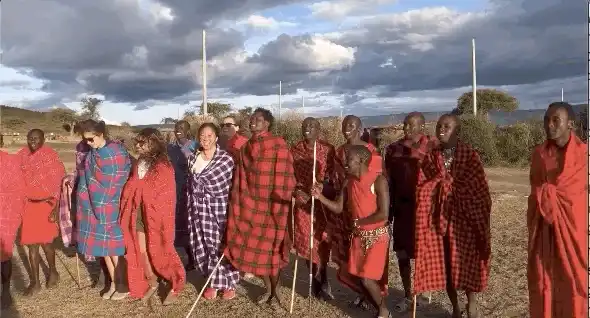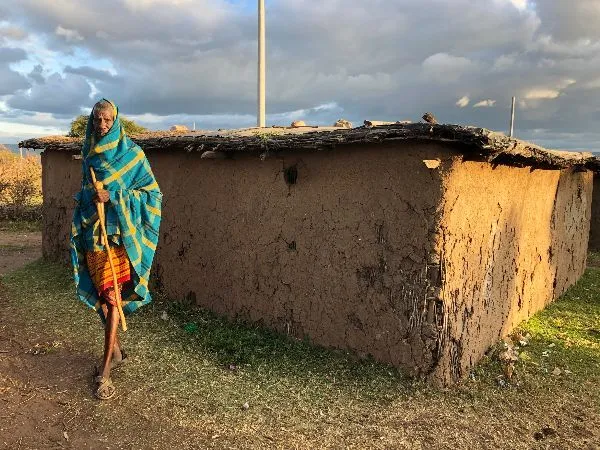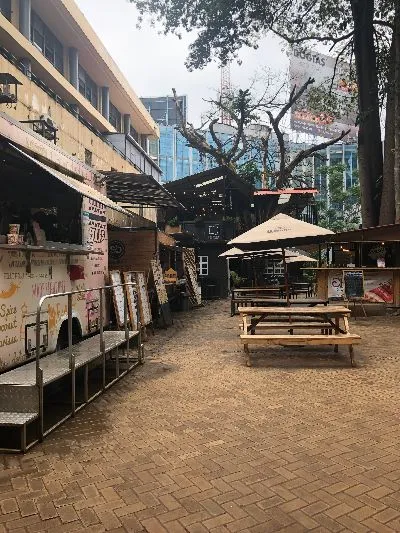Welcome to the Newsletter Series. Ivy and I co-write a periodic newsletter. This piece is adapted from an edition of it, dated when the newsletter came out.
Over the past two weeks we met a lot of people in Nairobi, from aid workers in the slums to C-suites at the mega companies. Many of our fundamental assumptions about Kenya have been shaken through the process. We’ll talk more about what we’ve learned about tech in this newsletter and share our other learnings in the next one. But first, wilderness!
Circle of Maasai Life
In Kenya there are 42 tribes each with its own dialect, although official languages are English and Swahili. The Maasai are the people residing near the Maasai Mara National Park, which borders Tanzania and becomes the Serengeti on the Tanzania side. In Maasai culture, males and females lead very different lives.

When a boy goes through puberty, they get circumcised, then go off into the wild with a few elders for about 5 years. There, they are taught how to survive by hunting, scavenging, and making medicines. At the end of the journey, about a quarter of the boys don’t make it back alive. When boys are around 22, they marry their first wives. Their parents pick the girl for them, paying the girl’s parents in livestock for her. Males can have multiple wives and after the first one, the rest are of his own choosing. The rest of his life is spent taking care of livestock and providing for the family(s).
When a girl goes through puberty, she too is circumcised, except for girls it is more accurately called female genital mutilation. Then at the ripe age of 14, she is ready to be married off. When a girl is married, she is in charge of building the house for her and her husband out of cow poop. The rest of her life is spent making trinkets to sell at the market, bearing children, and fetching water from ideally clean sources not contaminated by sewage.

A house made of cow poop
Voluntours
Our friend Kayee recommended this great tour company called Voluntours that uses its profits to try and disrupt this cycle. Culture unfortunately cannot be changed so easily, but there are people who have broken from traditions of their own choosing: boys deciding to go to school instead of into the wild, girls asking to not be circumcised. When a child is educated, they are able to make more informed choices about what they want when they come of age. Voluntours helps build schools to give the children a chance at education.
But just building a school isn’t enough because the girls often have to spend many hours fetching water, trekking to the distant stream (which also is where bathing and other activities happen). So to give the girls more hours in their day, Voluntours is also building water tanks and piping systems to bring filtered water in close walking distance. As for the boys that need to take care of livestock during the day, the schools are open through the night so the boys can study in the evenings.
Other projects they’re tackling include the collection of water bottles from all the safaris that go through the park. They fill them with sand to use as the foundation for building a community center for the local women to sell the trinkets they make (civil / material engineer friends, is this structurally sound??).
In the Savannah
But how was the actual safari with them, since that’s what we were primarily paying for.
Since we were there during the low season, there were fewer animals than usual because many had migrated back to the Serengeti side. This meant we were less likely to see a live kill (which we indeed didn’t get to see), but it also meant there were way fewer other tourists/vehicles to accommodate so we could get really close to the animals! Our guides were really good at spotting animals from afar and we got to see all of the super seven, including some lions making love and elephants crossing our path.
All in all, if you like watching animals in their natural habitats or driving in endless prairies where you occasionally spot something cool Pokemon Snap-style, we would highly recommend the experience!

The Silicon Savannah
Now let’s talk about tech. On this trip we’ve gone into each place asking why is this place the way it is? How did this place develop into a startup hub? This was the same for Nairobi - how come when the world talks about African startup scenes it’s all about Nairobi for East Africa and Lagos for West Africa? Lagos is the largest city in all of Africa with 21 million, which inevitably creates opportunities. However, Nairobi can hardly compete with just under 5 million.
Here are the top three reasons why Nairobi is a hub
- It’s a nice place to live physically because there’s nice weather, hikes nearby, and the ocean a short flight or train ride away for holidays
- One of the two main centers of the UN across the continent is here in Nairobi. This means already a lot of expats and therefore services, restaurants, and a whole ecosystem already built for expats. There is a lot of development funding here because of the UN’s proximity.
- All business is conducted in English, yet, you don’t feel like you’re in Europe (ahem Northern Africa, South Africa). If you’re into emerging markets, communication would be easier in Nairobi than other hot markets like Latin America or South East Asia.
More expats attract more expats. More funding attracts more funding. It’s a cycle.
Speaking of funding, there is a lot of bias towards funding more expat started companies. We’ve chatted with a few VCs, and the common answers are that expats are more likely to start businesses that attract venture (dream bigger vs SME) and that the communication, networking, and pitching ability is simply stronger amongst expats. These expats are typically those who came here to join a startup and after a few years decided to start their own.

An example of expat/rich Kenyan city life: The Alchemist Nairobi - Food trucks and fancy treehouse restaurants by day, party central with live music by night (Oktoberfest Nairobi was hosted here).
The Scene
Here we’ll share some snippets from startups we spoke to, the unique challenges they face.
Safaricom - The godfather of the tech community. It is a telecom company started by Vodaphone (a European company) and the Kenyan government. Everyone has a Safaricom sim card and everyone, from high-end restaurants to grocery stores to drivers to vendors in slums use M-Pesa, the mobile payment application made by Safaricom. It is what makes Kenya one of the world leaders in mobile money. More on this next newsletter.
With their mass penetration of agents (those that help deposit and withdraw money into M-Pesa), they are now expanding into digital farming. They have already signed on 1.5 million small scale farmers to be their exclusive distributor and will use agents to facilitate agriculture education, Agritech, and resource distribution to the farmers.
Jumia - Everyone has heard of the e-commerce startup that IPO’d. One problem logistics companies have to deal with in Africa are places with no addresses. Jumia’s UX requires users to manually fill out the address (without google autofill like Uber) and pin their location.
Upon receiving an order or when a delivery is ready to happen that day, the delivery driver calls the customer to confirm the address and availability. This is because sometimes the person ordering may not be the smartphone user. The staff also need to call the customer multiple times to ensure they are home at the time of delivery - it seems like once is enough until you learn about “Africa time” = not on time.
Even after the many calls, sometimes a customer would still not be home at the time of delivery. There’s a huge issue around logistics of handling redeliveries. Jumia has to develop very unique internal operations in dealing with shipping logistics, returns, and customer and seller support - made especially difficult since many still pay cash on delivery.
M-Kopa - Co-founded by one of the creators of M-Pesa, the aim was to allow people to buy large electronics in installments using M-Pesa. They quickly discovered people had no use for large electronics because they didn’t have enough electricity, so the company pivoted to selling solar panels in installments. By 2018, over 500,000 homes had solar panels wired up by M-Kopa. Now they’re working on designing low power televisions that can run all day just off solar power.
Swvl - a Cairo based startup famous for raising $42 million earlier this year, the largest round an Egyptian startup has ever raised, allows users to book fixed-rate rides on buses and vans in their network - often a premium version of public transport. They, along with Safaricom backed Little Shuttle have had trouble competing against the local Matatus (minivans) that are Kenya’s public transport within cities and between cities.
Turns out the reason these new human logistics startups keep getting shut down due to regulation with the government is that the existing network of Matatus is run by cartels. In order to run any form of transport using minivans or scooters, one has to strike a deal with the leaders running the Matatus.